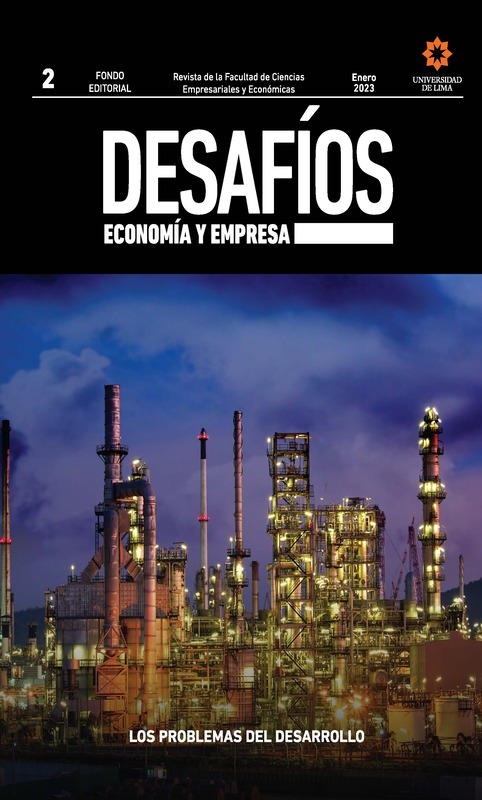Calidad de gobierno, renta petrolera y crecimiento económico en países latinoamericanos
DOI:
https://doi.org/10.26439/ddee2022.n002.5407Palabras clave:
Calidad de gobierno, renta petrolera, crecimiento económicoResumen
La presente investigación tuvo por objetivo estudiar el impacto de la renta petrolera y el crecimiento económico sobre la calidad de gobierno en diez países latinoamericanos. Con datos anuales obtenidos del Banco Mundial y la Guía Internacional de Riesgo País (ICRG), se estimó un modelo de datos de panel. Los resultados mostraron una relación significativamente negativa entre la renta petrolera y calidad de gobernanza debido a los altos incentivos para la búsqueda de rentas y la corrupción, lo cual genera prácticas ineficientes de inversión y gasto. Por otro lado, se encontró que el crecimiento económico tiene un efecto significativamente positivo sobre la calidad de gobierno, ya que el desarrollo económico mejora la eficiencia y ejecución del mecanismo de gobernanza formal, lo que genera mayores incentivos hacia las inversiones públicas para la mejora de la calidad de instituciones.
Descargas
Referencias
Acemoglu, D., & Robinson, J. (2012). Why nations fail: the origins of power, prosperity, and poverty. Crown Business. https://ia800606.us.archive.org/15/items/WhyNationsFailTheOriginsODaronAcemoglu/Why-Nations-Fail_-The-Originso-Daron-Acemoglu.pdf
Anthonsen, M., Löfgren, Å., Nilsson, K., & Westerlund, J. (2012). Effects of rent dependency on quality of government. Economics of Governance, 13(2), 145-168. https://doi.org/10.1007/s10101-011-0105-3
Arezki, R., & Brückner, M. (2011). Oil rents, corruption, and state stability: evidence from panel data regressions. European Economic Review, 55(7), 955-963. https://doi.org/10.1016/j.euroecorev.2011.03.004
Auty, R. M. (1993). Sustaining development in minerals economics: the resource curse thesis. Routledge. https://doi.org/10.4324/9780203422595
Baland, J., & Francois, P. (2000). Rent-seeking and resource booms. Journal of Development Economics, 61(2), 527-542. https://doi.org/10.1016/S0304-3878(00)00067-5
Beck, T., & Laeven, L. (2006). Institution building and growth in transition economies. Journal of Economic Growth, 11(2), 157-186. https://doi.org/10.1007/s10887-006-9000-0
Bina, C. (1992). The laws of economic rent and oil property: application to the oil industry. The American Journal of Economics and Sociology, 51(2), 187-203. https://doi.org/10.1111/j.1536-7150.1992.tb03347.x
Birdsall, N., Pinckney, T. C., & Sabot, R. H. (2000). Natural resources, human capital, and growth. Carnegie Endowment for International Peace. (Working Paper 9). https://carnegieendowment.org/files/natresources.pdf.
Bulte, E. H., Damania, R., & Deacon, R. T. (2005). Resource intensity, institutions, and development. World Development, 33(7), 1029-1044. https://doi.org/10.1016/j.worlddev.2005.04.004
Chang, H. J. (2003). Globalisation, economic development and the role of the State. Zed Books.
Chêne, M. (2017). Natural resource management transparency and governance: a literature review focusing on extractive. U4 Anti-Corruption Resource Center, Chr. Michelsen Institute, 8, 10-35. https://knowledgehub.transparency.org/assets/uploads/helpdesk/transparency-and-governance-of-natural-resourcemanagement-2017.pdf
Chevalier, J. M. (1976). Theoretical elements for an introduction to petroleum economics. En Jacquemin, A. P., de Jong, H. W. (Eds.). Markets, corporate behaviour and the state. https://doi.org/10.1007/978-1-4613-4376-9_13
Clague, C., Keefer, P., Knack, S., & Olson, M. (1996). Property and contract rights in autocracies and democracies. Journal of Economic Growth, 1(2), 243-276. https://doi.org/10.1007/BF00138864
Dávila, C. (2021). La influencia de la enfermedad holandesa en el crecimiento económico en el Perú (2007-2018) [Tesis de grado]. Universidad Nacional Toribio Rodríguez de Mendoza de Amazonas. https://hdl.handle.net/20.500.14077/2471
Dixit, A. (2003). On modes of economic governance. Econometrics, 71(2), 449-481. https://doi.org/10.1111/1468-0262.00415
Farzanegan, M. R., & Thum, M. (2020). Does oil rents dependency reduce the quality of education? Empirical Economics, 58(4), 1863-1911. https://doi.org/10.1007/s00181-018-1548-y
Fuinhas, J. A., Marques, A. C., & Couto, A. P. (2015). Oil rents and economic growth in oil producing countries: evidence from a macro panel. Economic Change and Restructuring, 48(3-4), 257-279. https://doi.org/10.1007/s10644-015-9170-x
Goldsmith, A. A. (2007). Is governance reform a catalyst for development? Governance, 20(2), 165-186. https://doi.org/10.1111/j.1468-0491.2007.00352.x
Greene, W. H. (2002). Econometric Analysis. Pearson. https://spu.fem.uniag.sk/cvicenia/ksov/obtulovic/Mana%C5%BE.%20%C5%A1tatistika%20a%20ekonometria/EconometricsGREENE.pdf
Gylfason, T. (2001). Natural resources, education and economic development. European Economic Review, 45(4-6), 847-859. Elsevier. https://doi.org/10.1016/S0014-2921(01)00127-1
Hausman, J. A. (1978). Specification test in econometrics. Econometrica, 46(6), 1251-1271. http://www.econ.uiuc.edu/~econ536/Papers/hausman78.pdf
Hausmann, R., Pritchett, L., & Rodrik, D. (2005). Growth accelerations. Journal of Economic Growth, 10, 303-329. https://doi.org/10.1007/s10887-005-4712-0
Isham, J., Woolcock, M., Pritchett, L., & Busby, G. (2005). The varieties of resource experience: natural resource export structures and the political economy of economic growth. The World Bank Economic Review, 19(2), 141-174. https://doi.org/10.1093/wber/lhi010
Knack, S., & Keefer, P. (1995). Institutions and economic performance: Cross-country tests using alternative institutional measures. Economics & Politics, 7(3), 207-227. https://doi.org/10.1111/j.1468-0343.1995.tb00111.x
Li, J. S. (2003). Relation-based versus rule-based governance: an explanation of the East Asian miracle and Asian crisis. Review of International Economics, 11(4), 651-673. https://doi.org/10.1111/1467-9396.00409
Manzano, O., & Monaldi, F. (2008). The political economy of oil production in Latin America. Economía, 9(1), 59-103. The Latin American and Caribbean Economic Association – LACEA. https://www.jstor.org/stable/40607908
Mauro, P. (1995). Corruption and growth. The Quarterly Journal of Economics, 110(3), 681-712. https://doi.org/10.2307/2946696
Mehlum, H., Moene, K., & Torvik, R. (2006). Institutions and the resource curse. The Economic Journal, 116(506), 1-20. https://doi.org/10.1111/j.1468-0297.2006.01045.x
Mira, R., & Hammadache, A. (2017). Good governance and economic growth: a contribution to the institutional debate about state failure in Middle East and North Africa. Asian Journal of Middle Eastern and Islamic Studies, 11(3), 107–120. https://doi.org/10.1080/25765949.2017.12023313
North, D. C. (1990). Institution, institutional change and economic performance (ed.). Cambridge University Press. https://doi.org/10.1017/CBO9780511808678
Rodrik, D. (2007). One economics, many recipes: globalization, institutions and economic growth. Princeton University Press. https://edisciplinas.usp.br/pluginfile.php/4093442/mod_resource/content/0/Rodrik%2C%20Dani%20One%20Economics%20%E2%80%A2%20Many%20Recipes.pdf
Sachs, J. D. & Warner, A. M. (1999). The big push, natural resource booms and growth. Journal of Development Economics, 59(1), 43-76. https://doi.org/10.1016/S0304-3878(99)00005-X
Smith, A. (1776). Investigaciones sobre la naturaleza y causas de la riqueza de las naciones. https://www.marxists.org/espanol/smith_adam/1776/riqueza/index.htm
Wooldridge, J. M. (2014). Introducción a la econometría: un enfoque moderno. Cengage Learning. https://issuu.com/cengagelatam/docs/wooldridge_issuu



